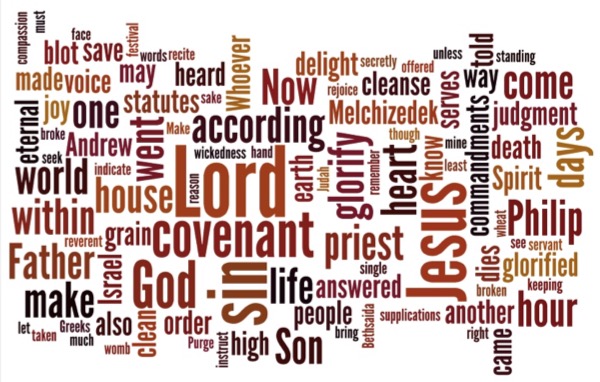5 Lent, March 22
The new covenant is not like the old, but what is new and what is old are each drawn from the deep providence of God, and remember that what is old and set aside may be renewed and recalled, rediscovered and commissioned in the cause of Christ. The break is not absolute. Outward signs are invisible graces, and vocation of any kind will hardly grow without structure, routine, and discipline. What monastics call conversion of manners is a reminder that our freedom in Christ is freedom for self-sacrificing and disciplined love in which each person stands before the great judgment seat of Christ and all those for whom Christ poured out sweat and blood. The New Covenant, therefore, is more a second attempt than a total rejection. All along, God has wanted the human heart.
| Jer. 31:31-34 • Ps. 51:1-13 or 119:9-16 Heb. 5:5-10 • John 12:20-33 |
The prophet Jeremiah speaks for the Lord: “I will put my law within them, and I will write it on their hearts; and I will be their God, and they shall be my people” (Jer. 31:33). The law is etched in visceribus (lungs, liver, stomach, entrails), and in the more acceptable chamber of the heart. The engraving is deep and convincing and gives purpose both to God and the Israelites. The people are, in this new covenant, in Deum (for, into, toward God). God, in turn, is in populum.
Divine and human meet in the interior mystery of the human person. “No longer shall they teach one another, or say to each other, ‘Know the Lord’” (Jer. 31:34). Evangelists fall silent. “They shall all know me, from the least of them to the greatest” (Jer. 31:34). Yet preachers will feel pure and pristine joy in the knowledge that Christ has written with bloody and permanent ink a long love letter to the world. He is an epistle of prayers and supplications, loud cries and tears, obedient to his humanity (Heb. 5:7). The tablet of his writing is a human life. He writes love and erases iniquity (Jer. 31:34).
God’s coming to the organs of the breast, to the chamber of the heart, is not a private resting in a merely private “interior castle.” God is for and toward his people. So the prophet promises for God: “The days are surely coming, says the Lord, when the city shall be rebuilt for the Lord” (Jer. 31:38). The reign of God is the cause of creation and the creating force of a peaceable city. God’s reign, as shown in Christ, is a great joy to all people. Thus, while supplications and tears pour out in the priestly offering of Christ, there is also, even if often hidden, abundant life and effusive joy. God is ludens in orbe terrarum (playing in the city of worlds; Prov. 8:31). “Happy are those who find wisdom” (Prov. 3:13). And who is wisdom, who is she but the image of the Word in us, Wisdom Herself (Ex Orationibus sancti Athanasii episcopi Contra Arianos; Oration 2, 78; 81-82).
Is our salvation purchased by a river of tears, or is it the announcement of joy? This dividing wall is broken down; salvation is both. The saved weep in union with the perfect offering of Christ and dance at the holy presence securing the foundations of the world, flowing through the streets of the city, coming to the willing soul and open heart. I sat down and wept! Praise him with timbrel and dance!
There is a signpost in the city, an unseen grace in the heart. “And when I am lifted up from the earth, I will draw all things to myself” (John 12:32). All sorrow, all joy.
Look It Up
Read Proverbs 3:3.
Think About It
New/old, inner/outer, despairing tears/delightful dance? One secure answer in one Christ.
 TLC on Facebook ¶ TLC on Twitter ¶ TLC’s feed ¶ TLC’s weblog, Covenant ¶ Subscribe
TLC on Facebook ¶ TLC on Twitter ¶ TLC’s feed ¶ TLC’s weblog, Covenant ¶ Subscribe









